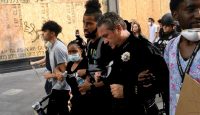
El mestizaje es la excusa del racismo en México
En México nos incomoda hablar de nuestro racismo. Nos gusta resguardarnos en la creencia de que, gracias al mestizaje, todos somos iguales y de que, si acaso, nuestra sociedad solo es clasista (como si eso nos debiera dejar más tranquilos). Sin embargo, aunque biológica y científicamente no exista ningún sustento para hablar de razas humanas, en nuestro país sí existe el racismo como prejuicio y como un proceso de exclusión social de grupos que encuentran dificultades y obstáculos para ejercer sus derechos.
Según el informe publicado por Oxfam México Por mi raza hablará la desigualdad, las características étnico-raciales (principalmente los tonos de piel oscuros, hablar una lengua indígena y/o autodefinirse como parte de un pueblo indígena o afrodescendiente) tienen efectos en las ocupaciones, el ingreso y los niveles educativos de las personas.… Seguir leyendo »



